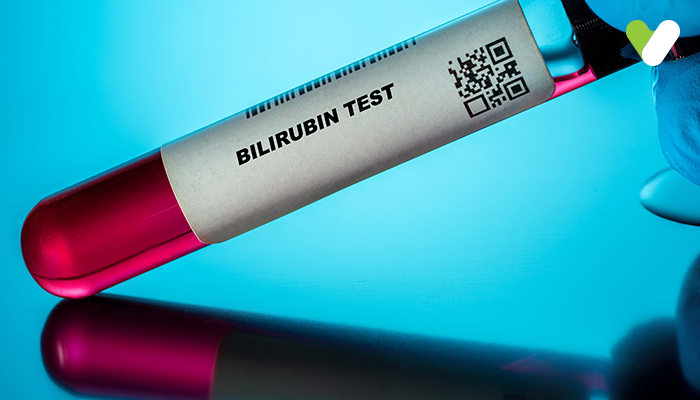A bilirubin test is a type of blood test that indicates the levels of bilirubin in your blood. Bilirubin is a yellowish pigment that is produced during the breakdown of red blood cells. Bilirubin progresses through the liver and is finally removed from your body through pooping. Higher bilirubin levels indicate various types of liver or bile duct problems like jaundice, anemia, and liver diseases. If your bilirubin level is higher than normal, then this portrays that either your red blood cells are breaking down at an abnormal rate or that your liver is unable to filter the waste properly.

The cost of the bilirubin test is Rs. 80-Rs.150 depending on your locality. Please check the price of this test in Delhi/NCR, your nearby centers and other details.
Test Summary
| Also known as | Total Serum Bilirubin, TSB |
| Test Type | Blood |
| Urinalysis test includes | Detects whether you have any liver or bile disease |
| Preparation | No special preparation is required |
| Reporting | Within 24hrs |
| Test price | The cost of the bilirubin test is Rs. 80-Rs.150 depending on your locality. Please check the price of this test in Delhi/NCR, your nearby centers and other details. |
| Also included in | Health Insurance Plans |
| Related tests | C-Reactive protein, CBC, liver function test, prothrombin time |
Why is the Bilirubin Test Recommended?
The doctors usually recommend this test as a part of a group of tests to check whether your liver is working properly or not. Bilirubin testing is done under the following conditions.- Investigate Jaundice: During jaundice, your skin and eyes turned yellow due to the elevated levels of bilirubin. Sometimes, bilirubin level is measured in newborns to check for infant jaundice
- To check whether there is any blockage in your bile ducts, liver or the gallbladder
- Detects liver disease, particularly hepatitis, or monitors its condition
- Detects anemia caused by the annihilation of red blood cells
- Checks how an ongoing treatment is working
- Detects a suspected drug toxicity
- Also detects whether you have sick cell disease or other conditions that cause hemolytic anemia. Under these conditions, your RBCs are destroyed quicker than they are made.
Your doctor may suggest this test if you are suffering from the below-mentioned conditions.
- Dark urine
- Nausea and vomiting
- Lower abdominal pain and swelling
- Clay-colored stools
- Extreme fatigue
The Test Results
A bilirubin test detects total bilirubin. The test result gives two different types of bilirubin: unconjugated and conjugated.Unconjugated (“Indirect”) Bilirubin
This bilirubin is produced from the breakdown of red blood cells. It travels in the blood to the liver.Conjugated (“Direct”) Bilirubin
This bilirubin is present in the liver and experiences chemical changes. This bilirubin is found in the intestine before being excreted through your stool.For adults over 18, the bilirubin normal range is 1.2 milligrams per deciliter (mg/dl) of blood. For those under 18, the normal level could be 1 mg/dl. Normal results for conjugated (direct) bilirubin should be less than 0.3 mg/dl. Men have higher bilirubin levels than female. African-Americans possess lower bilirubin levels than other traces.
Lower bilirubin levels don’t cause any concern. But high bilirubin may indicate liver damage or disease. If your direct bilirubin is higher than normal in your blood, then this may indicate that your liver isn't clearing bilirubin aptly. Higher levels of indirect bilirubin may portray some other health issues. Gilbert’s syndrome is a primary cause of elevated bilirubin. But this is a harmless condition where there is a deficiency in an enzyme that breaks down bilirubin. Your doctor may recommend some other tests to diagnose your condition. Bilirubin test results also play an imperative role in the progression of certain health issues, such as jaundice.
Reasons for High Bilirubin
High total bilirubin can be caused by various health conditions including:- Anemia
- Cirrhosis
- A reaction to a blood transfusion
- Gilbert syndrome (an inherited disease)
- Viral hepatitis
- Drug reactions
- Alcoholic liver disease
- Gallstones
- Some strenuous exercises like marathon running may enhance your bilirubin levels
Caffeine, penicillin, barbiturates, and nonsteroidal anti-inflammatory drugs (NSAIDs) called salicylates also minimize your bilirubin levels.
Newborns generally have a higher level of bilirubin, which goes down within a few days to 2 weeks. But if the level doesn’t go down, then this could be a sign of
- Incompatible blood type between mother and child
- Scarcity of oxygen
- An inherited infection
- A disease affecting the liver
During the Test Procedure
For bilirubin testing, you need to give your blood sample by visiting a lab or your nearby hospital. By inserting a small needle into your vein, a lab technician collects your sample, preferably from the vein of your upper hand. A small tube is fastened to the needle to collect the blood.You may feel a sharp pain as the needle is inserted into your arm. Some even experience a mild discomfort once the needle is removed. For newborns, the blood samples for bilirubin testing are usually obtained using a sharp lancet to break the skin of the heel (heel stick). You may notice a small bruise at the puncture site. Your sample blood will be sent to a laboratory for further analysis. You can resume your daily activities quickly once the sample is collected.
